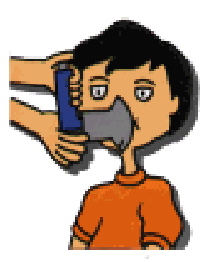At a loss for breath...

ASTHMA
Asthma is a disease that affects people's breathing. It is a common condition that affects the small air passages (bronchi) of the lungs and people with asthma will usually have sensitive airways. During an asthma attack, the small airways become narrow due to the passages becoming swollen and inflamed, and this leads to the production of mucus (fluid). This reduces the flow of air in and out of the lungs therefore making it even harder for the person to breathe. This can lead to coughing, tightness in the chest and wheezing. Not all children who have asthma will wheeze or cough.
Often people think asthma is a children's disease and although it is common in children, anyone can get asthma.
Asthma is more common than most people realise. About 1 in 5 children have asthma that can be easily identified and only have mild to moderate attacks. Up to 4 in 10 people have asthmatic tendencies but they usually grow out of it. 1 in 10 adults suffer with asthma. Some families may have both parents as asthma suffers yet the children are completely free from it. Fortunately very severe asthma is rare. However over 700 people die each year from asthma in Australia and half of those deaths are believed to be preventable through improved asthma management.
Around 2 million Australians have asthma, and this number is disappointingly on the increase. However the comforting news is that it can be controlled and the number of fatalities due to asthma is falling. Most people with asthma can live a healthy and active life if they follow some simple steps.
Asthma is triggered by different things
Asmtha has been found to be associated with conditions such as eczema, hayfever, croup and allergies and has also been found to run in families. Asthma is triggered by different things for different people. Some of the most common triggers of an attack are:
Having a cold
Cigarette smoke
Weather changes
Dust in the home or surroundings and dust mites
Cold air
Certain chemicals
Pollen
Some animals
Some emotional factors
Often there is more than one trigger for asthma for each person.
Asthma attacks can be regulated and controlled
If you think you have asthma then make sure you speak with your medical practitioner about this and they will be able to help you toward a course of action.
With the right treatment and proper management, almost all people with asthma can lead active lives and enjoy playing sports and participating in leisure activities. Asthma medicines work by either opening the narrow airways or preventing them from narrowing in the first place.
The two common medications are:
And of course logically it is especially wise to avoid triggers that you are aware of. If you know you are going to a nightclub or place where there will be a lot of smokers for example, make sure you take your asthma medication.
Make sure you get plenty of advice. Your doctor can help with medication and guidance as to the best form of treatment.
Once the best treatment has been prescribed for you, the doctor will explain how to use it. It is most important to note that Asthma medication may not work if it has not been taken correctly.
Get an asthma action plan in place. This will help you to prevent attacks and what to do if one hits. This plan can also be given to anyone close to you such as or your partner, work colleagues, employer, parent, teacher or friend.
What are some of the symptoms
Wheezing and coughing are common symptoms of asthma. Having a cough that won't go away after having a cold is often an indication that you may be an asthma sufferer. Feeling breathless after exercise, when you have hayfever or when you are around pets can also be a sign of asthma.
Coughing is most likely to happen:
At night
During the early hours of the morning
In cool weather
During exercise
What should be done if an asthma attack strikes
When someone you know coughs and wheezes because of their asthma and they are either too ill or just unable to get to their medication give them reliever medication two to three times over a few minutes - then every three to four hours if needed. If this does not help, then take the person to a medical clinic or hospital where they can receive speedy attention and treatment.
If YOU are an asthmatic make sure you always have your asthma medication with you and within easy reach!
Where to get help
Or call this hotline from the National Asthma council of Australia 1800 032 495
Things to remember
The common signs of asthma are coughing and wheezing.
Different triggers bring on asthma in different people.
Asthma can be controlled with reliever and preventer medication.
See your doctor if you are not responding well to reliever medication.
www.asthmaaustralia.org.au
http://www.australiawidefirstaid.com.au/more/asthma-anaphylaxis/
www.betterhealth.vic.gov.au
- Michelle Palmer
MORE
- Is Your Dad at Risk of Type 2 Diabetes?
- Australian-First Trial Examining Physical and...
- Dr Suzan Bekir Rosacea Treatment Interview
- Rebecca Hepatitis C Interview
- Cheryl Talent Eczema Awareness Month Interview
- Dee Honeychurch Paediatric Stroke Awareness...
- Have You Planned Your Heart Attack
- Sally Carkeet Living with Rheumatoid Arthritis...
- Managing Eczema Flare-Ups This Spring
- Rheumatoid Arthritis



